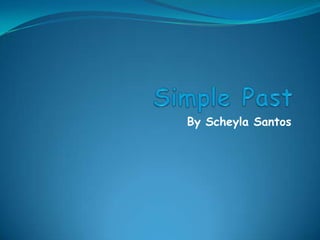
Simple past
- 2. Use ofSimplePast tense O passado simples é usado para expressar ações acabadas em um tempo definido do passado. Geralmente é empregado com advérbios de tempo como yesterday, twoweeks ago, lastyear
- 3. Verbs No Passado Simples, os verbos são divididos em Regulares e Irregulares.
- 4. Regular Verbs Regras: Acrescenta-se a terminação -ED aos verbos regulares para formar o passado simples; Ex: work – worked want - wanted Ao se acrescentar a terminação –ED, alguns verbos sofrem alterações: Em verbos terminados em –E, acrescenta-se apenas –D. Ex:love – loved
- 5. Em verbos terminados em –Yprecedidos de consoante, troca-se –y por –i e acrescenta-se -ED. Ex: study – studied Em verbos terminados em C-V-C, cuja sílaba tônica é a última, dobra-se a consoante final e acrescenta-se –ED. Ex: prefer – preferred stop - stopped
- 6. Irregular Verbs Os verbos irregulares geralmente apresentam formas distintas para o passado e, como não há regras para a formação desses verbos, eles precisam ser memorizados. Ex: go – went speak - spoke
- 7. AffirmativeForm No passado os verbos apresentam a mesma forma para todas as pessoas. SUJEITO + VERBO + COMPLEMENTO. Ex: I talked to heryesterday. Thedogranafter me yesterdaymorning. Theycalled me five minutes ago.
- 8. NegativeandInterrogativeforms Nas formas negativa e interrogativa do passado simples, deve-se utilizar o auxiliar DID, como se observa no exemplos a seguir. Affirmativeform- Shewent to schoolyesterday. Negativeform– Shedidnotgoto schoolyesterday. Interrogativeform – Didshego to schoolyesterday?
- 9. Nas formas Negativa e Interrogativa, com as quais é obrigatório o uso do Auxiliar DID, os verbos devem permanecer no infinitivo (sem o to – forma base do verbo)
- 10. Verb To Be O verbo to be é considerado irregular e, no passado simples, apresenta as formas WAS e WERE. WAS - para I, he, she, it WERE – parayou, we, they O verbo to be não precisa do verbo auxiliar (did) para perguntas ou negações.
- 11. Forma Negativa e Interrogativa do verbo to be Negativa: WAS NOT ou WASN’T WERE NOT ou WEREN’T Interrogativa: WAS + SUJEITO...? WERE + SUJEITO...?
